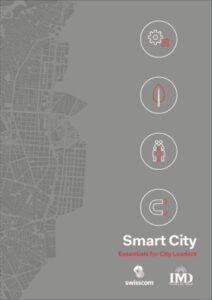
Swisscom announces a study in collaboration with IMD business school aimed at helping public authorities join the digital world. The study, entitled “Smart City: Essentials for City Leaders”, summarises the experiences of 25 cities, companies and start-ups that have all been leading the way in this field. The methodology presented contains specific tools that cities can employ to make themselves smarter and more innovative. As a digital leader in Switzerland, Swisscom showcases its involvement and expertise in the realm of the Internet of Things and Smart Data.
The public sector, like any other part of the economy, is impacted by ongoing digitisation. Digital technology produces new challenges, but above all represents an opportunity. In this context, Swisscom proves to be a skilled partner, helping to improve and create new services for the public, optimise city management, reduce energy consumption and thus offer a better quality of urban life. In short, digital technology offers cities the opportunity to transform themselves into “smart cities”.
Increasing the chances of success for smart city projects
The advantages and benefits of smart city projects are well established. There is still a lack of established processes for implementation and evaluation, however, so public authorities sometimes find themselves at a loss given the absence of structure and simplicity.
This is where the study “Smart City: Essentials for City Leaders” aims to help by providing a useful analytical tool, the “Smart City Piano”, that allows users to evaluate different projects based on three pillars. First of all, this method can be used to assess a project’s potential. Second, it permits optimum management of a project’s framework conditions, particularly in terms of political regulation. Finally, the “Smart City Piano” offers practical keys for managing the execution of a project under optimum conditions.
Michael Wade, professor of innovation and strategy and Director of the Global Center for Digital Business Transformation at IMD is convinced of the tool’s usefulness and further points out that “combining the research undertaken by IMD on the impact of digitisation and the study of success factors in a number of smart city projects has allowed us and Swisscom to produce a customized tool for resolving the problems faced by cities”. The study also explores the main motivations that cities have for implementing smart city projects and addresses the question underlying public authorities’ thinking: why become a smart city?
The study’s results will be put into practice by specialist consulting teams at Swisscom. Blaise Vonlanthen, head of consulting at Swisscom, has identified several lessons to learn from the study: “The Smart City Piano is an evaluation tool that will allow us to provide dedicated and structured support to cities on their way to digitisation. We will thus be able to help them concentrate on their most important projects and increase their chances of success.”
Support all the way
Swisscom has already proven its expertise in the area of smart city management. In Pully (VD), for example, it is working with the city to develop a mobility observatory to help improve infrastructure planning and make the city centre more attractive. “This analysis tool will enhance Swisscom’s service offering. It allows synergies to be exploited by combining different solutions and integrating various city departments,” explains Raphaël Rollier, head of Swisscom’s smart city programme.
For those who would like to see the “Smart City Piano” in action, the tool will be presented at the Swisscom dialogue experience, which will take place at the EPFL campus on 31 May. The event will also address the topic of smart lighting, which allows cities not only to reduce their electricity consumption and optimise maintenance, but also to manage traffic and monitor water consumption via water meters.
All urban zones, regardless of their size, can find answers in “Smart City: Essentials for City Leaders”. The “Smart City Piano” will be employed for the first time in the Aigle region, at the instigation of the ecovillages association. This should result in the emergence and implementation of innovative smart city projects focused on tourism, transport and energy.
Link to study “Smart City: Essentials for City Leaders”
Link to registration for the 2016 Swisscom dialogue experience (in French):https://www.swisscom.ch/fr/business/enterprise/actualites/events/dialogue-experience.html




